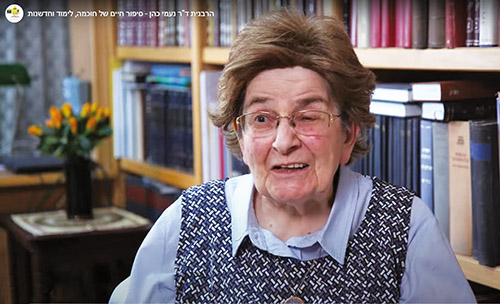
Note: Dr. Naomi Cohen was a rabbanit in the classic sense: a rebbetzin; not a “rabbi,” though she may have been more of a scholar than many “modern” rabbis!
It is pretty hard to marry a person who shines like the sun and not be eclipsed—but that is what happened when Naomi G. Cohen (daughter of Rabbi Herbert S. Goldstein) married future Jerusalem Deputy Mayor—who later became Haifa Chief Rabbi—Shear Yashuv Cohen.
It is pretty hard for a relative extrovert (in a good way!) like my Aunt Naomi to immediately make an incredibly positive impression on her future father-in-law, who was a nazir and almost never even left his house as a matter of principle. (Rabbi David Cohen was a confidant of Chief Rabbi Kook, edited some of Rav Kook’s writings and taught at Rav Kook’s yeshiva; actually, the students came to him.) The Nazir wrote in his diary: “My daughter-in-law, Naomi, came into my life by great mazal and good fortune.” (And, don’t forget, he was a serious mystic!) And it was the Nazir who encouraged Naomi to specialize in the study of Philo in the original Greek!
It is pretty hard to write about such a person as Naomi G. Cohen and not leave out important material. I therefore hereby incorporate by reference everything you will find about her on the internet and in the biography of Chief Rabbi Shear Yashuv Cohen, and will confine myself here primarily to my associations with her that do not appear on the internet or in her husband’s biography.
Naomi grew up in a household where one parent and her sister were a bit more traditional in their thinking and affiliations, and she and her other parent were more “modern.” When I went to Israel to study simultaneously at the Hebrew University and at the Machon Harry Fischel (probably unprecedented), my parents conditioned my doing so on having my Aunt Naomi pre-approve my courses and professors at the university. When my aunt saw that I wanted to study Bible at the university with a certain professor who was not exactly a traditionalist, my aunt said she had some qualms about letting me study with this professor, but she said “but I trust you.” (He turned out to be relatively uncontroversial and superficial and didn’t influence me one iota.)
Fast forward to the end of my uncle’s life, when his biography was written in Hebrew, I encouraged my aunt to arrange for the biography to be translated into English; she asked me to edit the translation, and she asked me for my opinion about a proposed translator who was not a rabbi (which gave my aunt some pause), although the then-proposed translator already had a Ph.D. and a close friendship with my aunt. Upon doing my due diligence, I sensed that Dr. Irene Lancaster was not quite as traditional as my uncle (who almost uniquely could relate with people from the most liberal to the most conservative), but I was so impressed with her credentials and writing style that I approved of her anyway, to be entrusted with this very responsible function. We had come full cycle.
When I proposed adding a chapter to the English edition about my uncle’s travels outside of Israel, my aunt asked, almost rhetorically, who would write it. I seized the opportunity to do so and thereby interact with the cream of the modern American Orthodox rabbinate, scholars, and philanthropists, many of whom had been close to my uncle and in some cases my aunt as well.
At my mother’s shiva, my aunt had commented that, as a girl, she (my aunt) had always envied my mother for being very well behaved. My mother, of course, was not just well behaved but also a high achiever in her own right, serving as president or co-president of a prominent national women’s organization herself, and in many other prominent leadership roles. But I couldn’t help thinking that most people envied my aunt, who may have been a bit more outgoing as a child—and as an adult—but who also lived a rabbi’s daughter’s dream: Making aliyah the year after the country of Israel came into existence, marrying somebody with the credentials referred to above, and so many additional credentials, who also happened to be tall, handsome and charming—and a war hero; entering academia guided by a father-in-law who had distinguished himself in academia and in the yeshiva world; and then founding a chapter of what was to become known as Emunah at the request of the wife of Chief Rabbi Herzog. Naomi became a co-founder of “the Israeli Women’s Lobby,” and a co-founder of Kolech (“Your Women’s Voice”). She also taught at two universities, and published widely. Not only did she write in favor of Orthodox women studying the Talmud, beginning when this was almost unheard of, but she taught such a class herself for close to 40 years.
Dr. Naomi Cohen led a full life, with incredible grace and charm, seeming to have time for a wide circle of friends and all her many descendants, and even for her admiring nieces and nephews. May she continue to inspire people in death as she did in life to live the dream.
Rabbi Reichel will be available again, after the pandemic, to speak about the best of the 150+ ironies involving the chief rabbi, and some involve the rabbanit as well. He can be reached at [email protected].













